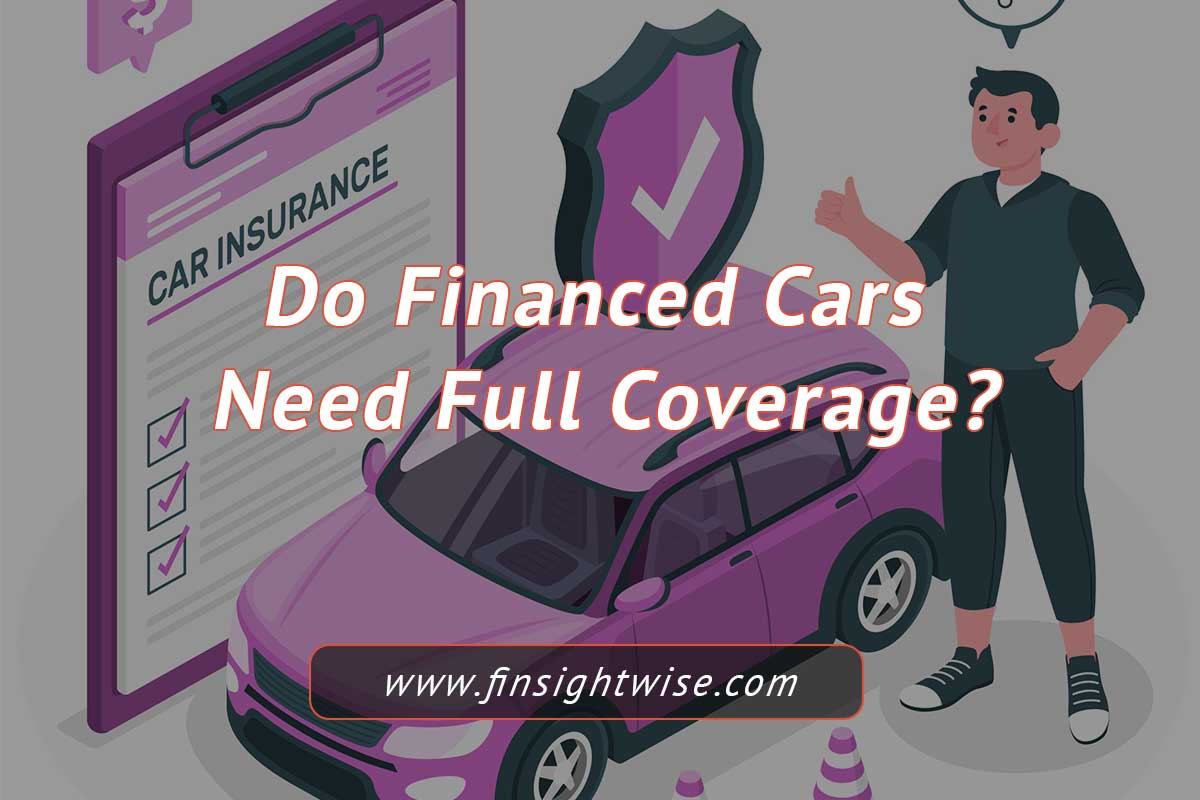As the proud owner of a financed car, you may be wondering if full coverage is truly necessary. After all, the monthly payments and insurance premiums can add up quickly. However, before you decide to skimp on coverage, it's essential to understand the implications of not having adequate car insurance for your financed vehicle.
In this blog post, we'll dive into the reasons why lenders often require full coverage and what it means for your finances and peace of mind. We'll also explore alternative options and provide tips for choosing the right insurance plan for your financed car.
So, if you're ready to make an informed decision about your car insurance and protect your investment, keep reading!
"Do Financed Cars Need Full Coverage? Discover the essential insights that will help you make the best decision for your financed car and your wallet."
Table of Contents
ToggleUnderstanding Full Coverage
What Is Full Coverage Auto Insurance?
When we talk about full coverage auto insurance, we typically refer to a combination of different types of coverage. This is designed to protect you in various situations, ensuring you're financially secure on the road.
Components of Full Coverage
Full coverage generally includes three main components:
- Liability Insurance: This covers damages to other people and their property if you're at fault in an accident.
- Collision Coverage: This pays for repairs to your vehicle after an accident, regardless of who is at fault.
- Comprehensive Coverage: This protects against non-collision incidents, such as theft, vandalism, or natural disasters.
Why Is Full Coverage Often Misunderstood?
Many drivers mistakenly believe that having liability insurance is sufficient. However, without collision and comprehensive coverage, you could face significant out-of-pocket expenses if your car is damaged or stolen.
Importance of Understanding Your Policy
It's crucial to read and understand your insurance policy thoroughly. Knowing what is covered can help you avoid unexpected costs and ensure you have the right protection for your financed vehicle.
Do Financed Cars Need Full Coverage?
If you have a financed car, you'll likely need to maintain full coverage insurance until the loan is paid off. This protects both you and the lender in case of an accident or theft.
What is Full Coverage?
Full coverage typically includes liability, collision, and comprehensive coverage. It provides protection against various risks such as accidents, theft, and damage to your vehicle.
Why is Full Coverage Required?
Lenders require full coverage to safeguard their investment. If you only have liability insurance and your car is damaged, you'll be responsible for repair or replacement costs.
What Happens Without Full Coverage?
If you downgrade to liability insurance while still owing money on your car, you'll be violating your loan agreement. This could result in the lender canceling your loan and repossessing your vehicle.
Reviewing Your Coverage
After paying off your loan, you can consider reducing your coverage. However, it's wise to maintain adequate protection based on your vehicle's value and your financial situation.
Lender Requirements for Financed Cars
Why Lenders Mandate Full Coverage
When you finance a car, lenders want to protect their investment. This is why they often require full coverage insurance. It ensures that if something happens to the vehicle, the loan can still be repaid.
How Full Coverage Protects Both Parties
Full coverage not only safeguards the lender’s interests but also provides you with peace of mind. If your financed car is damaged or stolen, you won't face a financial burden that could jeopardize your ability to pay off the loan.
Typical Lender Requirements
Most lenders will specify their insurance requirements in the loan agreement. Here are some common stipulations:
- Maintain collision coverage to cover damages to your vehicle.
- Include comprehensive coverage for protection against theft and other non-collision incidents.
- Provide proof of insurance before finalizing the loan.
Understanding Your Loan Agreement
Always review your loan agreement carefully to understand the insurance requirements. This will help you avoid any surprises and ensure you comply with your lender's expectations throughout the financing period.
Consequences of Not Having Full Coverage
The Risks of Insufficient Coverage
If you choose to forgo full coverage on your financed car, you may face significant risks. Without adequate protection, you could be left with hefty repair bills or replacement costs in the event of an accident or theft.
What Happens with Only Liability Coverage?
Liability coverage may meet the minimum requirements, but it does not protect your vehicle. If you're in an accident, you'll be responsible for all repair costs, which can be financially devastating.
Financial Repercussions of Being Underinsured
Here are some potential consequences of not having full coverage:
- You may have to pay out of pocket for repairs if your car is damaged.
- If your car is stolen, you will not receive any compensation for its loss.
- In the event of an accident, you could face legal action if damages exceed your liability limits.
Real-Life Examples
Consider a scenario where a financed car is involved in an accident. If the driver only has liability coverage, they may end up with a significant financial burden, especially if the vehicle is a total loss. This highlights the importance of maintaining full coverage.
Alternatives to Full Coverage
When to Consider Lower Coverage Options
While full coverage is often required for financed cars, there are situations where you might consider lowering your coverage. Understanding these scenarios can help you save money while still protecting your investment.
Permissible Downgrades After Loan Payoff
Once your loan is paid off, you may have the option to downgrade your insurance coverage. Here are some factors to consider:
- If your car has depreciated significantly, you might opt for lower coverage.
- Consider your financial situation and ability to cover potential repair costs.
- Evaluate how often you drive and the risks associated with your driving habits.
Factors to Evaluate Before Reducing Coverage
Before making any changes to your insurance policy, consider the following:
- Your vehicle’s current market value and condition.
- Your personal financial situation and risk tolerance.
- The potential costs of repairs or replacement should an incident occur.
Consulting with Your Insurance Agent
It’s wise to discuss your options with your insurance agent. They can provide insights tailored to your specific situation and help you determine the best coverage level for your needs.
Tips for Choosing the Right Insurance
Key Factors to Consider
Selecting the right insurance for your financed car is crucial. Here are some key factors to keep in mind when evaluating your options:
- Coverage Needs: Assess what level of coverage is necessary based on your vehicle's value and your financial situation.
- Premium Costs: Compare premiums from different providers to find a balance between affordability and adequate coverage.
- Deductibles: Consider how much you can afford to pay out of pocket in the event of a claim.
Comparing Insurance Providers
When looking for insurance, it’s essential to shop around. Here are some tips for comparing providers:
- Check online reviews and ratings to gauge customer satisfaction.
- Request quotes from multiple companies to find the best rates.
- Inquire about discounts for safe driving or bundling policies.
Understanding Policy Terms
Before finalizing your insurance, make sure you fully understand the policy terms. Pay attention to:
- The coverage limits and exclusions.
- How claims are handled and processed.
- The duration of the policy and renewal terms.
Regularly Reviewing Your Coverage
Your insurance needs may change over time. Regularly reviewing your policy ensures that you have the right coverage as your circumstances evolve, whether it’s due to changes in your vehicle, driving habits, or financial situation.
Frequently Asked Questions - FAQs
Q. Do I need full coverage on a financed car?
A. Yes, most lenders require full coverage insurance on financed vehicles to protect their investment and ensure you are financially secure in case of an accident or theft.
Q. What does full coverage include?
A. Full coverage typically includes liability, collision, and comprehensive coverage, providing protection against various risks such as accidents, theft, and damage to your vehicle.
Q. Can I drop full coverage after paying off my loan?
A. Yes, once your loan is paid off, you can consider dropping full coverage. However, it's wise to maintain adequate protection based on your vehicle's value and your financial situation.
Q. What happens if I only have liability insurance?
A. If you only have liability insurance, you will not be covered for damages to your financed car in an accident, leaving you responsible for repair or replacement costs.
Q. How can I find affordable full coverage insurance?
A. To find affordable full coverage insurance, compare quotes from multiple providers, ask about discounts, and consider adjusting your deductible to lower your premium costs.
Q. What are the risks of not having full coverage?
A. Without full coverage, you risk facing significant out-of-pocket expenses for repairs or replacements if your car is damaged or stolen, which can be financially burdensome.
Q. How often should I review my insurance policy?
A. It's advisable to review your insurance policy annually or whenever your circumstances change, such as after paying off a loan or purchasing a new vehicle.
Q. Can my lender require specific insurance providers?
A. Yes, some lenders may have preferred insurance providers or requirements outlined in your loan agreement. Always check with your lender for specific guidelines.
Q. What should I do if I can’t afford full coverage?
A. If full coverage is unaffordable, consider shopping around for better rates, increasing your deductible, or discussing your situation with an insurance agent for tailored solutions.
Q. How do I provide proof of insurance to my lender?
A. You can provide proof of insurance by submitting a copy of your insurance policy or declaration page to your lender, ensuring it meets their coverage requirements.
Conclusion
Summary of Key Points
Throughout this article, we've explored the importance of full coverage insurance for financed cars. Understanding lender requirements, the risks of insufficient coverage, and your options can help you make informed decisions.
Final Thoughts on Insurance Needs
Maintaining the right level of insurance is crucial for protecting both your vehicle and your financial well-being. Regularly reviewing your policy ensures that you adapt to any changes in your circumstances.
Take Action Today
Evaluate your current insurance coverage and consider whether it meets your needs. Consult with an insurance agent to explore options that best fit your situation and provide peace of mind as you drive your financed car.


